

7 Essential Emotional Support Animal Laws PA Residents Must Know
by Lena Park
Last updated: July 25, 2025
Verified and Approved by:
Angela Morris,
MSW, LCSW
Fact Checked

Overview
The main question addressed by the article is what essential emotional support animal laws Pennsylvania residents must know. It acknowledges the emotional challenges many individuals face and outlines key regulations, including the Fair Housing Act and the Air Carrier Access Act. These laws are crucial as they ensure that individuals with emotional support animals have rights regarding housing and travel.
The article emphasizes the importance of proper documentation and highlights the legal distinctions between emotional support animals and service animals, offering reassurance and support to those navigating these complexities.
Introduction
Navigating the intricate landscape of emotional support animal laws in Pennsylvania can feel overwhelming for many residents, particularly those facing mental health challenges. It’s not just about understanding the legal framework surrounding Emotional Support Animals (ESAs); it’s about finding the comfort and companionship these animals offer. As the demand for ESAs grows, so too do the complexities and misconceptions regarding their rights and regulations.
What essential laws should Pennsylvania residents be aware of to fully benefit from their emotional support companions? This article explores seven crucial emotional support animal laws that every Pennsylvania resident must know, shedding light on their rights and responsibilities in this evolving legal landscape.
Wellness Wag: Streamlined ESA Letter Services for Pennsylvania Residents
At Wellness Wag, we understand the emotional challenges that many individuals in Pennsylvania face concerning emotional support animal laws pa when dealing with mental health issues. The process of obtaining an Emotional Support Animal (ESA) letter is designed to be straightforward and compassionate.
It begins with a brief assessment to determine eligibility, allowing us to truly understand your needs. Following this, a consultation with licensed medical professionals ensures that you receive the support you deserve. Once approved, you can expect to receive your official ESA letter within just 24 hours.
This quick turnaround is crucial, as it allows you to access housing and travel accommodations without unnecessary delays. Our efficient service is particularly beneficial for those navigating the complexities of mental health challenges, as it alleviates the stress of managing emotional support animal laws pa.
We are here to support you every step of the way, ensuring you feel cared for and understood.
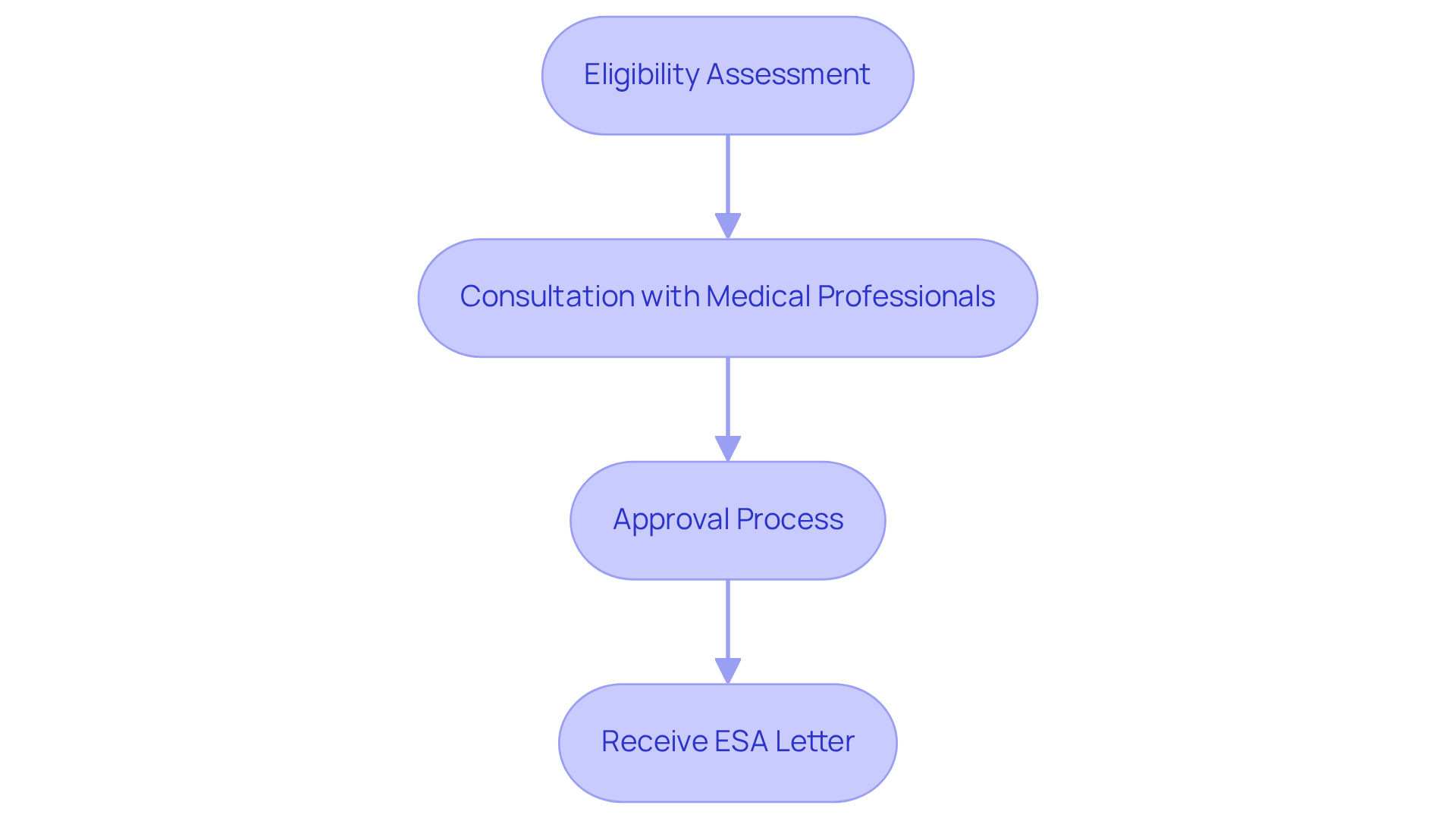
Fair Housing Act: Protections for Emotional Support Animals in Housing
The Fair Housing Act (FHA) serves as a crucial pillar of protection for individuals with Emotional Support Animals (ESAs) under emotional support animal laws PA in Pennsylvania. This important legislation establishes that housing providers must make reasonable accommodations for tenants with emotional support animal laws PA, even in properties that typically restrict pets. If you have a valid ESA letter, landlords cannot deny your request to keep your emotional support companion, provided that the animal does not pose a direct threat to others or cause significant property damage.
Many individuals face emotional challenges, and the presence of an ESA can be a vital source of comfort and stability. Recent statistics reveal that approximately 18% of pet owners in the U.S. have emotional support animals, highlighting a growing reliance on these companions for mental health support. Legal experts emphasize that the FHA’s provisions are designed to prevent discrimination against individuals with disabilities, ensuring they can live alongside their emotional support animals, in accordance with emotional support animal laws PA, despite common housing restrictions.
Furthermore, there have been numerous instances where tenants have successfully navigated housing challenges with the help of ESA letters, demonstrating the importance of proper documentation. For example, some tenants have effectively contested landlords who sought to deny ESA requests, citing the protections afforded by the FHA. This underscores the need for tenants to be aware of their rights and the responsibilities of landlords under the FHA.
In conclusion, the Fair Housing Act plays a vital role in safeguarding the rights of individuals with emotional support animals, as outlined in emotional support animal laws PA, ensuring they receive the necessary accommodations to live comfortably and securely with their beloved companions. Remember, you are not alone in this journey; support is available to help you navigate these challenges.
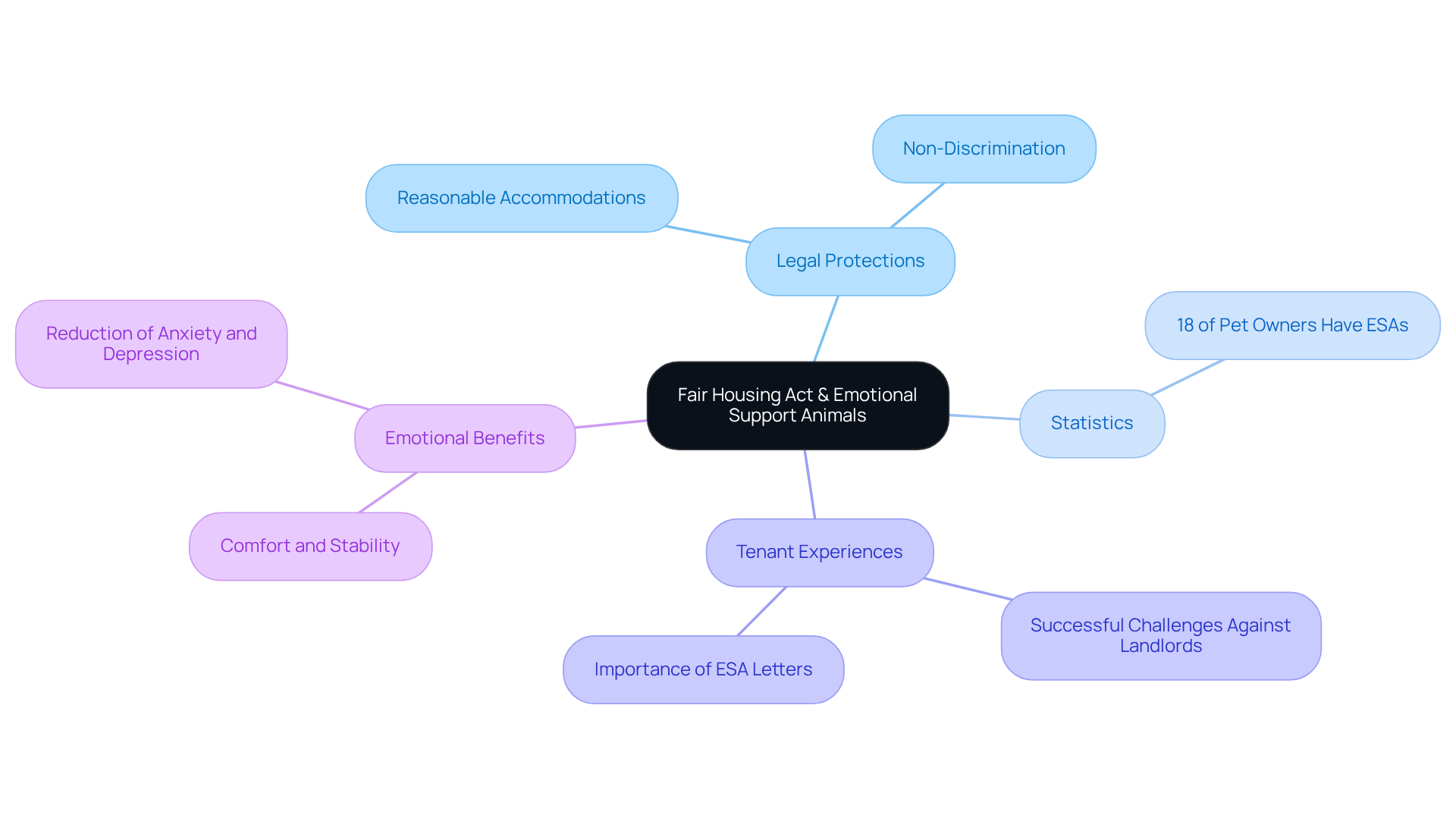
Air Carrier Access Act: Rights for Traveling with Emotional Support Animals
Traveling can be a daunting experience, especially for individuals facing emotional challenges. The Air Carrier Access Act (ACAA) acknowledges the significance of emotional support animal laws pa in offering comfort and companionship during flights. This regulation ensures that airlines accommodate emotional support animals, but it requires passengers to present the necessary documentation, including a valid ESA letter. As we look ahead to 2025, it’s heartening to note that around 70% of airlines continue to accept emotional support animals, reflecting a growing understanding of their significance. In fact, registrations for these beloved companions have surged by 50% in the past five years.
However, it’s essential to remember that emotional support animal laws pa can vary widely between carriers. This variability can lead to unnecessary stress if travelers do not verify their airline’s specific requirements in advance. Ensuring compliance with these policies is crucial for avoiding potential travel disruptions. Recent updates to airline regulations have highlighted the need for appropriate documentation, which may include forms from the Department of Transportation (DOT) that certify the pet’s health, behavior, and training. This step is vital in creating a seamless travel experience for both you and your emotional support animal under emotional support animal laws pa.
To support your journey, it’s advisable to proactively gather all required paperwork and confirm your airline’s stance on ESA travel at least 48 hours before your flight. This preparation can help facilitate a hassle-free journey, allowing you to focus on what truly matters—your well-being and the comfort that your emotional support animal provides. Remember, you are not alone in this process; there are resources and support available to help you navigate your travel experience with care and compassion.
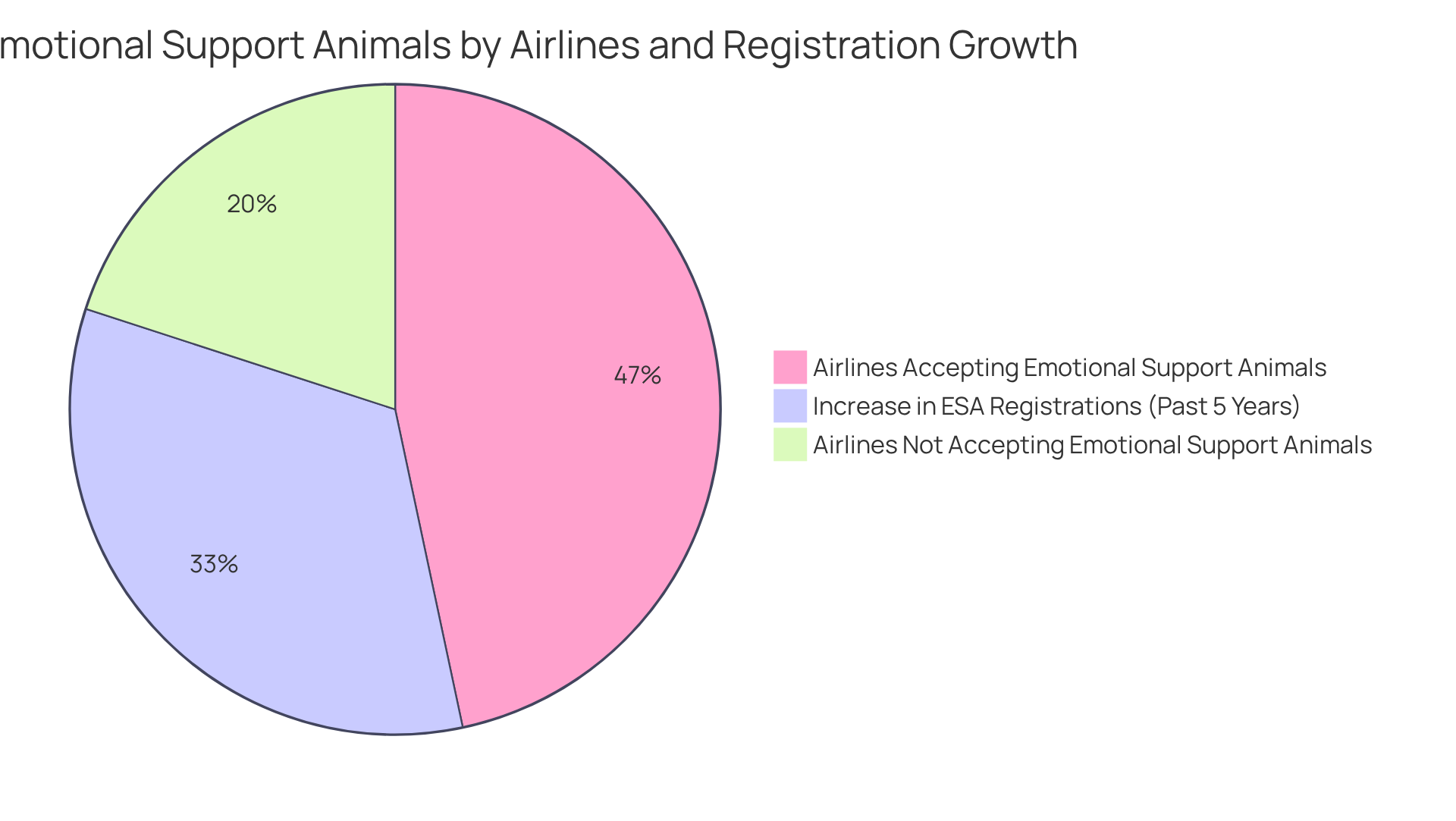
Service Animals vs. Emotional Support Animals: Legal Definitions and Differences
Understanding emotional support animal laws pa and the legal distinctions between service creatures and emotional support companions (ESAs) is vital for those navigating mental health challenges. Service creatures, as defined by the Americans with Disabilities Act (ADA), are specially trained to assist individuals with disabilities, providing them with significant access rights in public spaces. On the other hand, emotional support animals offer comfort and companionship, yet they do not possess the specialized training that service animals do. This difference means that emotional support animal laws pa provide protection for these animals under various regulations, such as the Fair Housing Act and the Air Carrier Access Act, which allow their presence in housing and during travel. The Fair Housing Act mandates that landlords comply with emotional support animal laws pa by making reasonable accommodations for individuals with disabilities, ensuring that these animals can be part of their lives.
Despite these clear legal definitions, many individuals remain confused. In fact, approximately 70% of pet owners either struggle to understand how to certify their pets as emotional support animals or mistakenly believe their pets do not qualify. This misunderstanding can create significant challenges for ESA owners, particularly in environments where pets are restricted. Advocates for the rights of these beings stress the importance of recognizing these differences to ensure that both assistance creatures and emotional support animal laws pa provide the legal protections and support they deserve.
Real-life stories illustrate the profound impact of emotional support animal laws pa on individuals. For instance, many individuals with emotional support animals report remarkable improvements in their mental health, with 62% of these owners noting enhanced well-being during the COVID-19 pandemic. Furthermore, 73% of ESA owners rated their pets’ effectiveness in improving mental health as eight or higher on a scale of ten. This highlights the essential role emotional support animals play in providing emotional assistance, especially for individuals who may not qualify for a service animal but still seek comfort and support.
If you find yourself struggling with mental health issues, consider how an emotional support animal might enrich your life. The journey to understanding and navigating the legal aspects of ESAs can be daunting, but knowing that support is available can make a world of difference.
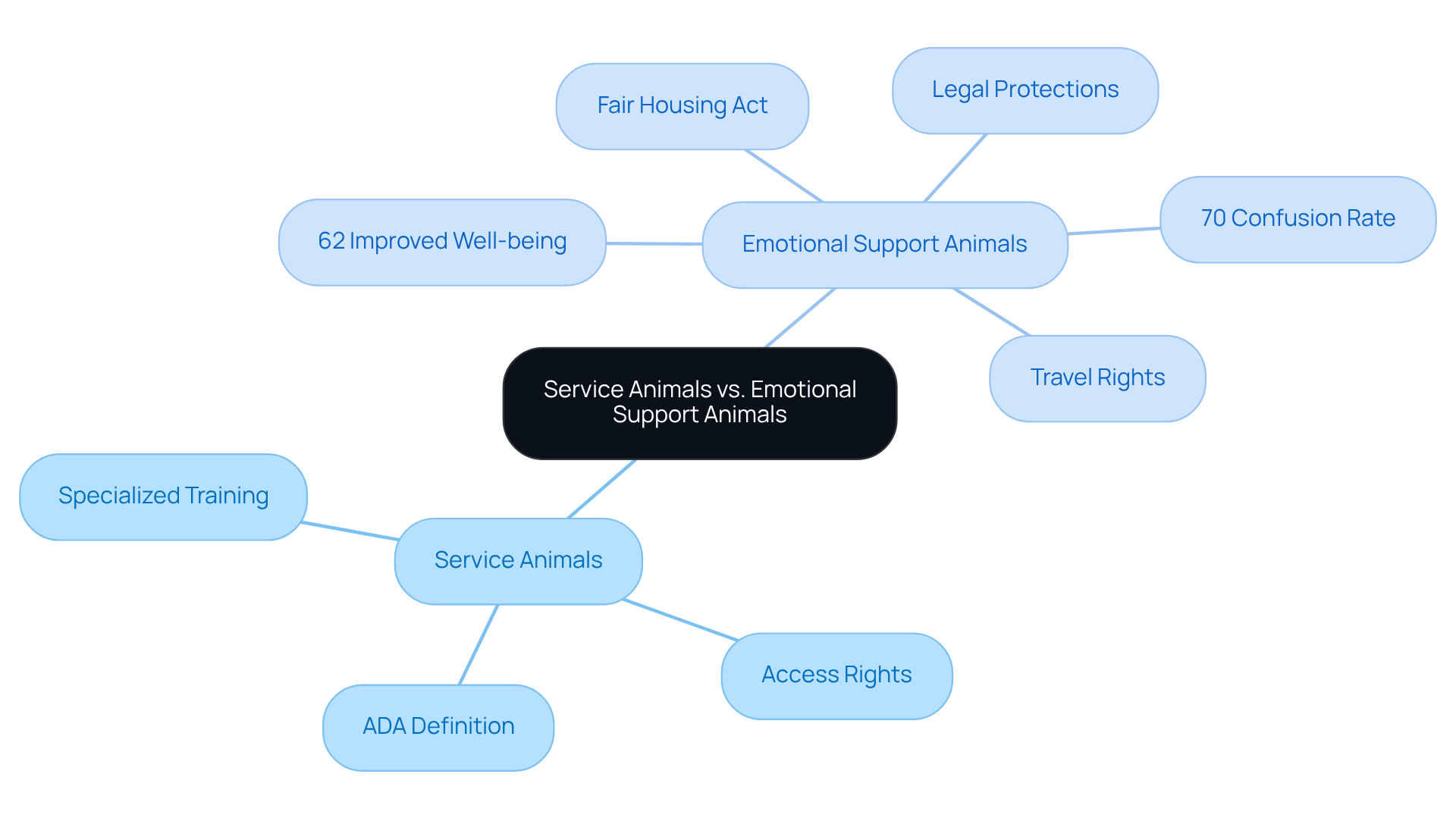
Pennsylvania ESA Laws: Key Regulations for Residents
In Pennsylvania, many residents face emotional challenges that can feel overwhelming. For those seeking the comfort of an Emotional Support Animal (ESA), it is essential to navigate emotional support animal laws pa to ensure their needs are met.
While the state aligns with federal guidelines regarding emotional support animal laws pa, it’s crucial to understand the importance of obtaining a valid letter from a licensed mental health expert. This letter serves as a vital document, clearly articulating the individual’s need for an ESA due to a mental health condition.
By securing this letter, residents can advocate for their rights in housing and travel situations, allowing them to experience the support and companionship that an ESA can provide.
Remember, you are not alone in this journey; the support you seek is within reach.
Public Access Rights: Where Emotional Support Animals Can Go in Pennsylvania
In Pennsylvania, individuals seeking comfort from Emotional Support Animals (ESAs) may encounter challenges related to emotional support animal laws PA. Unlike service animals, which enjoy full public access, ESAs are primarily restricted to housing and travel arrangements. This means that while you can bring your emotional support animal into your home or on flights, access to restaurants, stores, and other public spaces is often limited unless explicitly permitted by the establishment. It’s important to recognize that about 18% of pet owners in the U.S. rely on emotional support creatures, reflecting a growing dependence on these loving companions for emotional assistance.
However, it’s crucial for ESA owners to understand that businesses are not legally obligated to allow emotional support animals, which can lead to feelings of frustration and confusion. Many people mistakenly believe their ESAs have the same rights as service animals, creating additional challenges in public settings. To navigate this landscape, ESA owners should take proactive steps to research pet-friendly establishments and familiarize themselves with their rights under the Fair Housing Act. While this act provides essential protections in housing situations, it does not extend to public access.
Moreover, the Assistance and Service Animal Integrity Act outlines the legal framework governing emotional support animal laws PA, emphasizing the importance of having proper documentation. Misrepresenting an ESA can result in penalties, including fines, highlighting the need for honesty in these matters. Remember, you are not alone in this journey; support is available, and understanding your rights can help you navigate the complexities of having an emotional support animal.
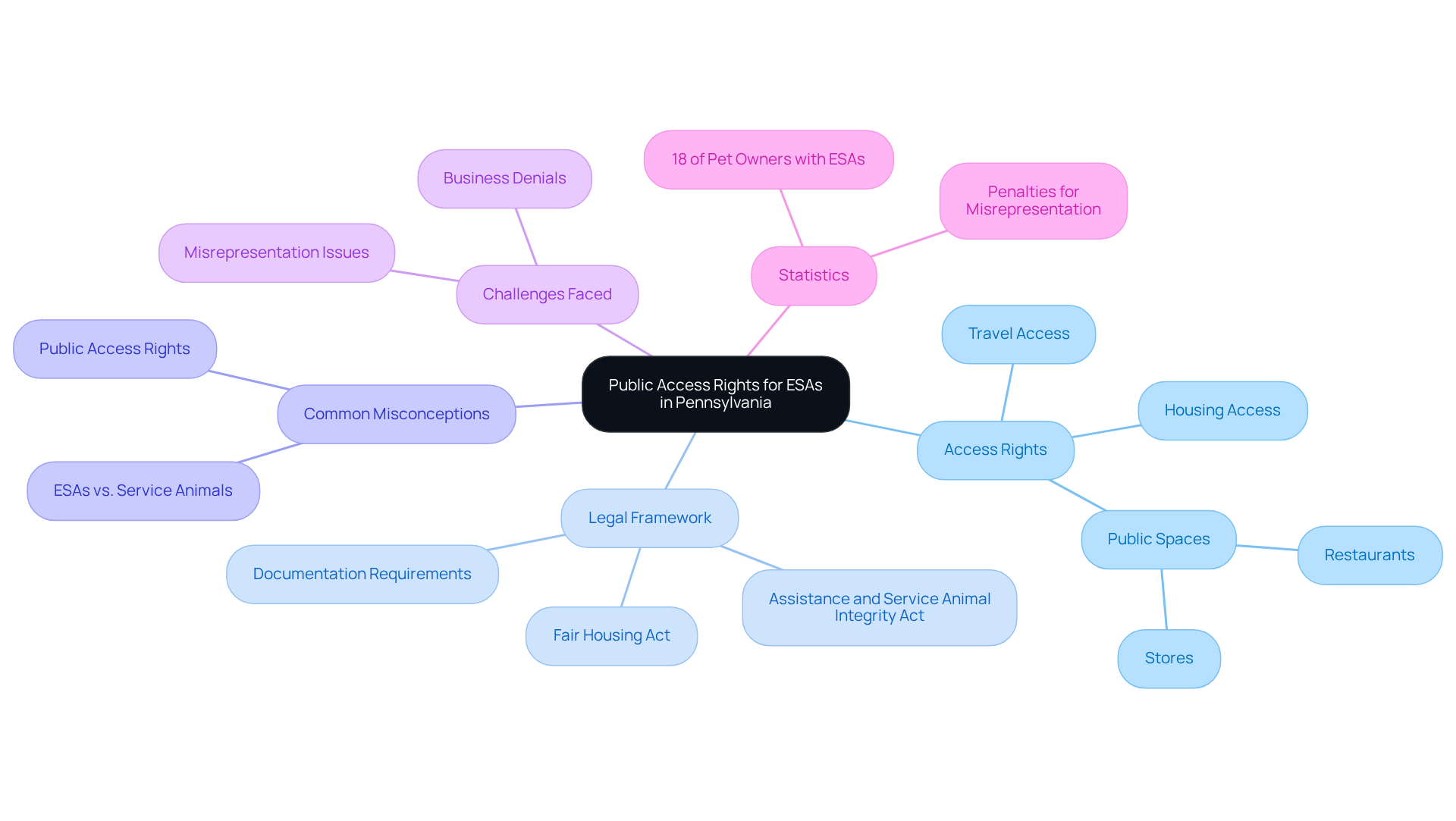
Landlord Obligations: Accepting Emotional Support Animals in Rental Properties
In Pennsylvania, many individuals face emotional challenges that can be overwhelming, which is where emotional support animal laws PA come into play. For those with mental health issues, emotional support animal laws PA can ensure that having an Emotional Support Animal (ESA) provides significant comfort and companionship. Thankfully, landlords are required to accept ESAs as part of reasonable accommodations under the Fair Housing Act (FHA). This legal framework ensures that tenants with valid ESA letters can access their beloved pets, even in properties that typically enforce strict no-pet policies. In fact, approximately 52.61% of fair housing complaints in 2023 were related to disability discrimination, highlighting the importance of landlords understanding and respecting these rights to prevent potential legal issues.
Landlords do have the right to request documentation to verify the legitimacy of the ESA. This documentation must come from a licensed mental health professional who has an established relationship with the tenant. While landlords cannot impose additional fees for ESAs, as outlined by the FHA, they can set reasonable conditions to ensure the safety and well-being of all tenants. For instance, they may require that the pet is well-behaved and does not pose a threat to others, which is a reasonable expectation for a harmonious living environment.
Recent legal cases have shown how crucial it is for landlords to comply with these regulations. Failing to do so can lead to complaints being filed with the Department of Housing and Urban Development (HUD). Successful experiences for tenants often hinge on clear communication and proper documentation. These elements can significantly ease interactions between tenants and landlords regarding ESA acceptance. As we look ahead to 2025, it is essential for landlords in Pennsylvania to navigate emotional support animal laws PA with care, fostering an inclusive environment for tenants who require emotional support.
For tenants, being prepared is key. Ensuring that they have their ESA documentation ready before approaching landlords can help streamline the process, making it smoother and less stressful. This proactive approach not only benefits tenants but also encourages a supportive dialogue that acknowledges their needs and feelings.

Documentation Requirements: Proving Your Emotional Support Animal’s Legitimacy
Navigating the complexities of emotional challenges can be overwhelming, especially for those facing mental health issues. To comply with emotional support animal laws pa, individuals must provide appropriate documentation confirming their pet’s status as an Emotional Support Animal (ESA). This documentation often includes a letter from a licensed mental health professional, clearly articulating the individual’s need for an ESA due to a diagnosed mental health condition. Key elements of this letter encompass the professional’s contact information, license number, and a definitive statement regarding the necessity of the animal for emotional support.
Having this documentation readily accessible is crucial for successfully managing housing and travel situations. It ensures compliance with the Fair Housing Act and emotional support animal laws pa, which obligates landlords to accommodate tenants with valid ESA letters, regardless of any no-pet policies. It’s important to note that landlords cannot impose extra charges or deposits related to emotional support animal laws pa, further underscoring the necessity of legitimate documentation.
With over 50,000 patients served by Wellness Wag, the streamlined process for obtaining ESA letters highlights the vital role of proper documentation in securing housing and travel accommodations. If you find yourself in need of support, prioritizing your ESA documentation can lead to a smoother experience, allowing you to focus on what truly matters—your well-being and the companionship of your emotional support animal.
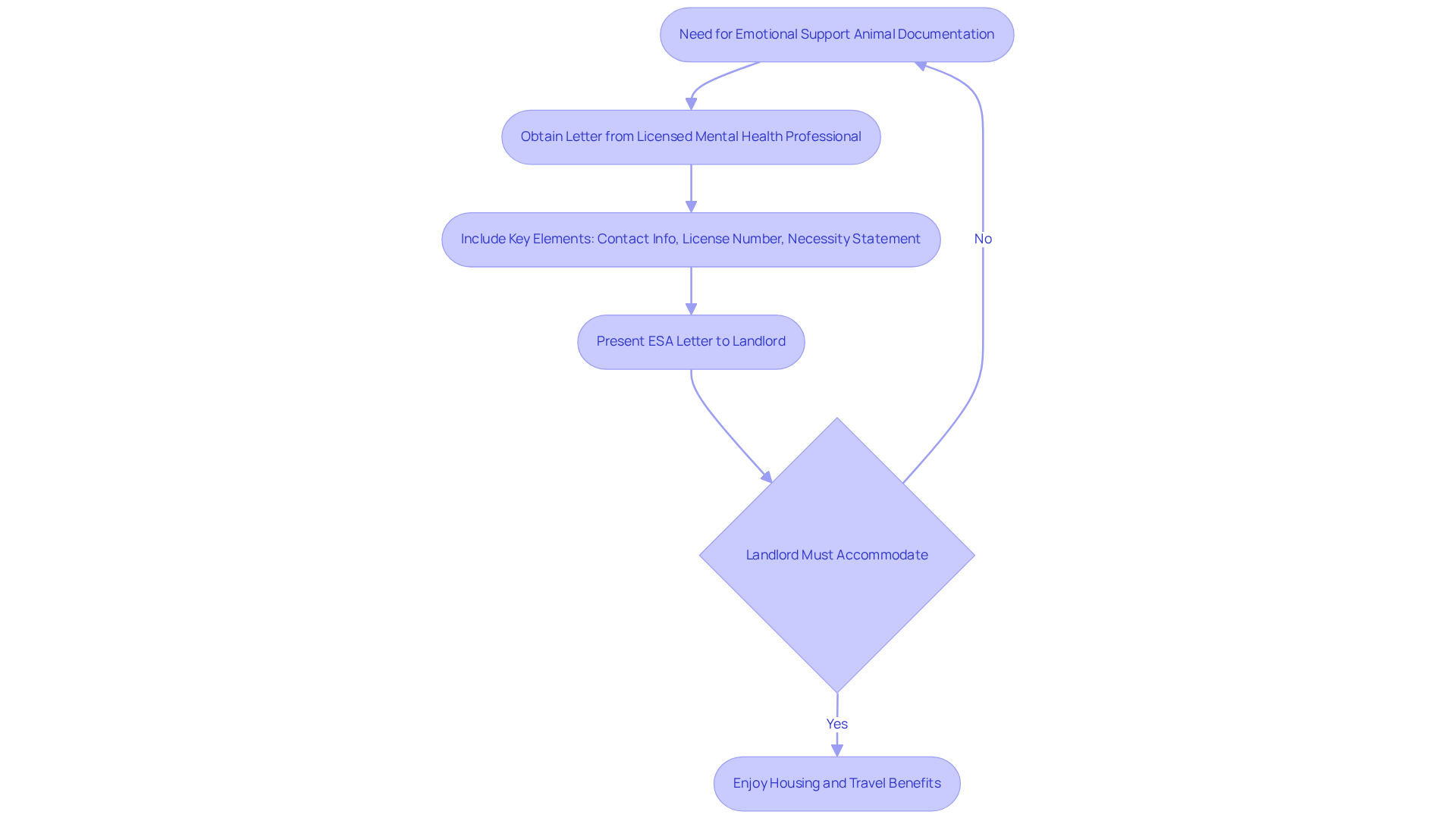
Fraudulent ESA Requests: Legal Challenges and Protections in Pennsylvania
In Pennsylvania, the challenges posed by fraudulent requests for letters under emotional support animal laws PA are deeply concerning. These misrepresentations undermine the integrity of a system that is meant to support individuals with genuine emotional needs. For those who falsely claim the necessity of an ESA, the consequences can be severe, including fines of up to $1,000 for misrepresentation and potential criminal charges that could result in penalties of up to $2,500.
To combat this troubling issue, the Assistance and Service Animal Integrity Act has been enacted, empowering communities to request written verification of a resident’s disability and need for emotional support animal laws PA. This measure is crucial in reducing fraudulent claims and protecting those who truly require support.
Legal specialists emphasize the importance of these protective measures, noting that they help safeguard the rights of authentic ESA owners who rely on their companions for emotional support. The act not only establishes penalties for deceptive requests but also provides protection to landlords and associations from liability regarding legitimate assistance animals. Recent statistics reveal a concerning rise in legal cases involving fraudulent ESA letters, underscoring the necessity for ongoing vigilance and enforcement of emotional support animal laws PA.
As the number of individuals seeking emotional support animals continues to rise, it becomes increasingly important to ensure that only legitimate requests are acknowledged. This not only protects the rights of those who genuinely benefit from the companionship of their support animals but also fosters a community where emotional needs are understood and addressed with compassion.
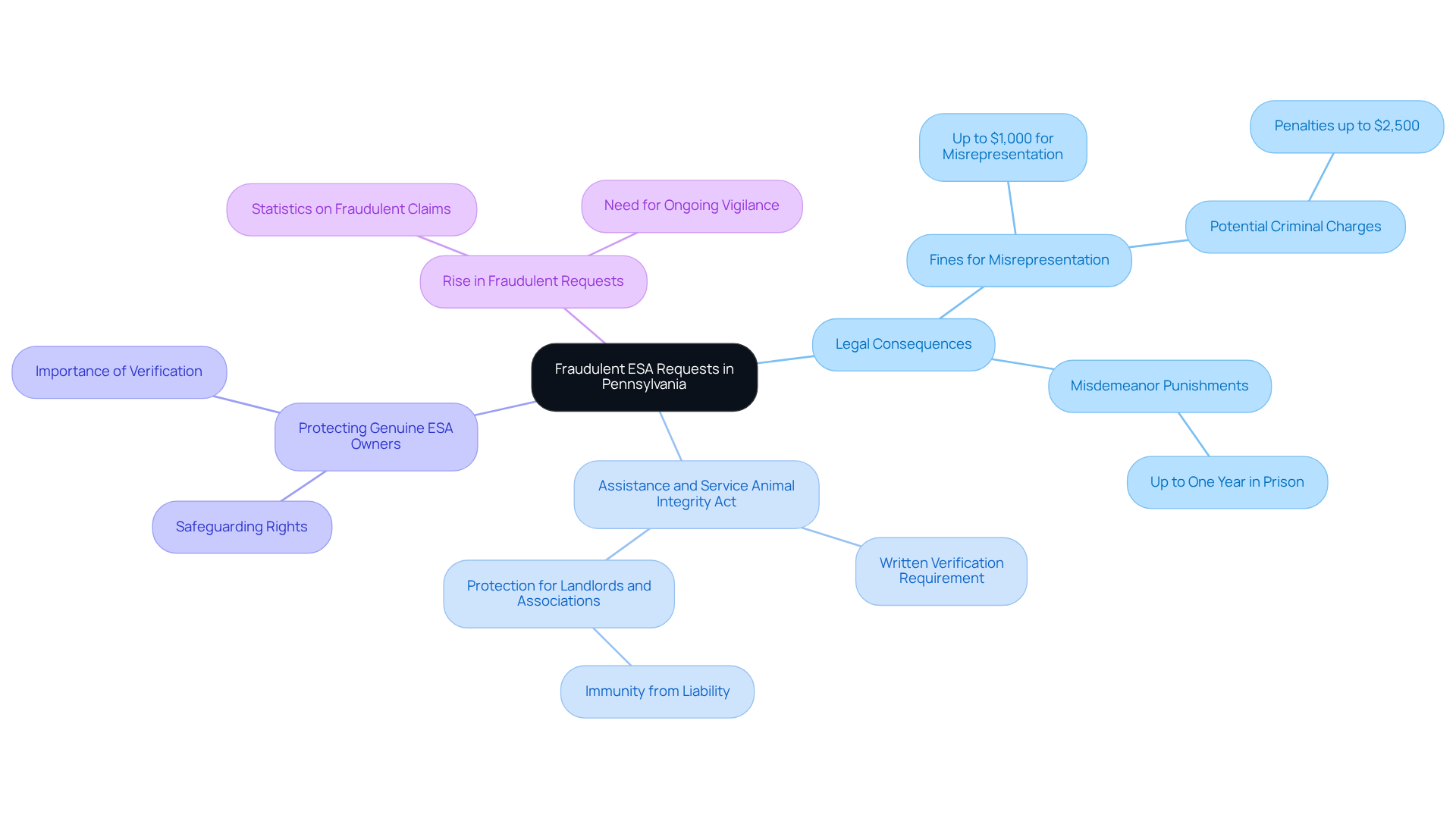
Mental Health Professional Involvement: Essential for Obtaining ESA Letters
In Pennsylvania, the emotional support animal laws pa require securing a legitimate Emotional Support Animal (ESA) letter through the compassionate guidance of a licensed mental health professional. These caring professionals conduct thorough evaluations of an individual’s mental health needs, thoughtfully determining the appropriateness of an ESA for their unique situation. This assessment is crucial, as it ensures that the ESA letter adheres to emotional support animal laws pa and protects the rights of those who genuinely need support.
Have you ever felt overwhelmed by your mental health challenges? You’re not alone. Research shows that nearly 18% of pet owners in the U.S. have ESAs, and this percentage is growing as more people recognize the emotional benefits they provide. The integrity of the emotional support animal laws pa system relies on these evaluations, ensuring that only those who truly need support animals receive the necessary documentation.
By obtaining an ESA letter through licensed professionals, you not only safeguard your rights but also enhance the overall credibility of the ESA framework. This fosters a responsible and nurturing approach to emotional support in our community. Remember, help is available, and you deserve the support that an ESA can bring into your life.
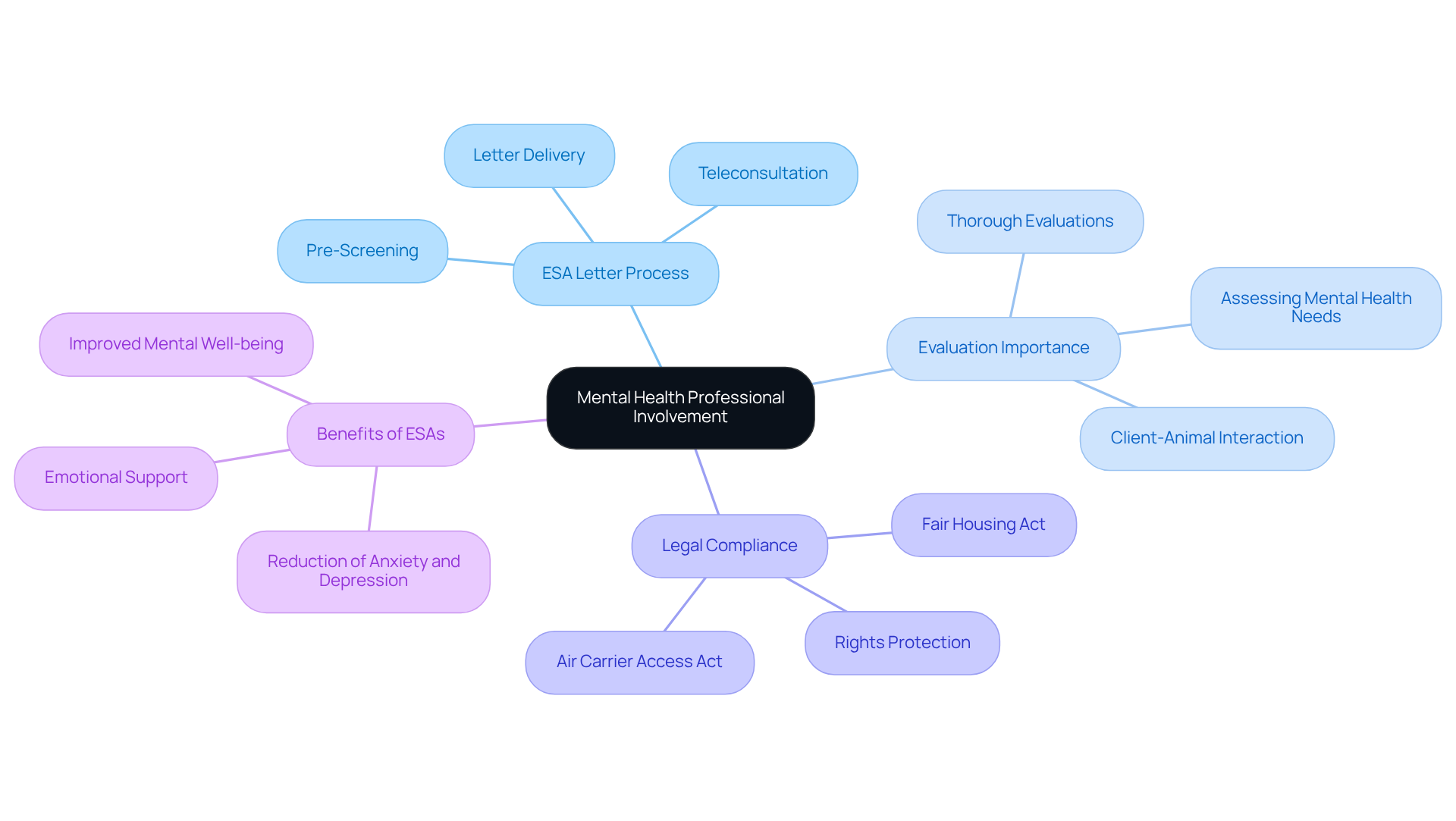
Conclusion
Understanding emotional support animal laws in Pennsylvania is crucial for residents seeking the comfort and companionship that ESAs provide. These laws protect individuals facing mental health challenges, allowing them to live with their emotional support animals without facing discrimination or undue hardship.
Individuals often experience emotional struggles that can feel overwhelming. The presence of an ESA can bring significant relief and companionship during these challenging times. Throughout this article, we explored key points, such as the Fair Housing Act’s provisions, the Air Carrier Access Act’s regulations, and the vital role of mental health professionals in obtaining ESA letters. The importance of proper documentation, the differences between service animals and ESAs, and landlord obligations were also highlighted. These factors collectively emphasize the need for awareness and adherence to emotional support animal laws, fostering a supportive environment for those in need.
As the landscape of emotional support animal regulations evolves, staying informed about your rights and responsibilities is essential. Whether you’re navigating housing challenges or planning travel with an ESA, being proactive and knowledgeable can significantly enhance your experience. Remember, seeking support from reputable services like Wellness Wag can further streamline the process, ensuring that your journey toward emotional well-being is as compassionate and stress-free as possible. You are not alone in this journey; support is available to help you thrive.
Frequently Asked Questions
What services does Wellness Wag provide for obtaining an ESA letter in Pennsylvania?
Wellness Wag offers streamlined services for obtaining an Emotional Support Animal (ESA) letter, including a brief assessment to determine eligibility, a consultation with licensed medical professionals, and the issuance of the official ESA letter within 24 hours once approved.
How does the Fair Housing Act protect individuals with Emotional Support Animals in Pennsylvania?
The Fair Housing Act (FHA) requires housing providers to make reasonable accommodations for tenants with valid ESA letters, allowing them to keep their emotional support animals even in properties that typically restrict pets, as long as the animal does not pose a direct threat or cause significant property damage.
What is the significance of having an ESA letter when renting a property?
Having a valid ESA letter is crucial as it protects tenants from discrimination and allows them to contest landlords who may deny their request to keep an emotional support animal, ensuring they can live comfortably with their companion.
How does the Air Carrier Access Act (ACAA) support traveling with Emotional Support Animals?
The ACAA requires airlines to accommodate emotional support animals if passengers present the necessary documentation, including a valid ESA letter, ensuring that individuals facing emotional challenges can travel with their companions.
What should travelers know about airline policies regarding Emotional Support Animals?
Airline policies regarding Emotional Support Animals can vary widely, so it’s essential for travelers to verify their airline’s specific requirements and gather all necessary documentation, including health and behavior forms, at least 48 hours before their flight to avoid travel disruptions.
What recent trends have been observed regarding Emotional Support Animals and airline travel?
Approximately 70% of airlines continue to accept emotional support animals, reflecting a growing understanding of their importance, with registrations for these companions increasing by 50% in the past five years.
Certify Your Emotional Support Animal Today

Why You Can Rely on Us?
At Wellness Wag, we believe your pet deserves care rooted in both science and compassion. Each article is carefully researched, written in clear language for pet owners, and then reviewed by qualified professionals to ensure the information is evidence-based, current, and practical for real-life care. Our goal is to help you feel confident in making informed decisions about your pet’s health and well-being.
Reviewed by
Angela Morris, MSW, LCSW
Angela is a licensed clinical social worker with 20 years of experience in patient advocacy and community mental health. She has assisted numerous clients with ESA evaluations and brings a deep understanding of disability accommodations, ensuring that all information is accurate, supportive, and practical.

Written by :
Lena Park
Last Updated :
July 25, 2025












